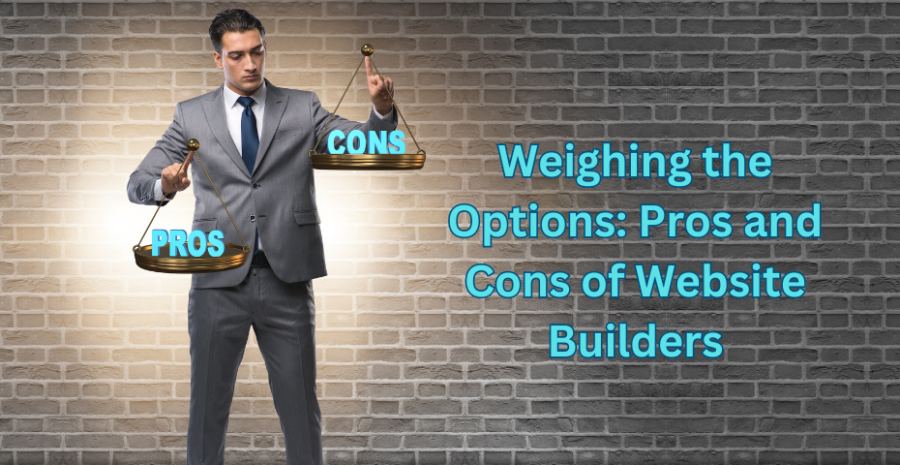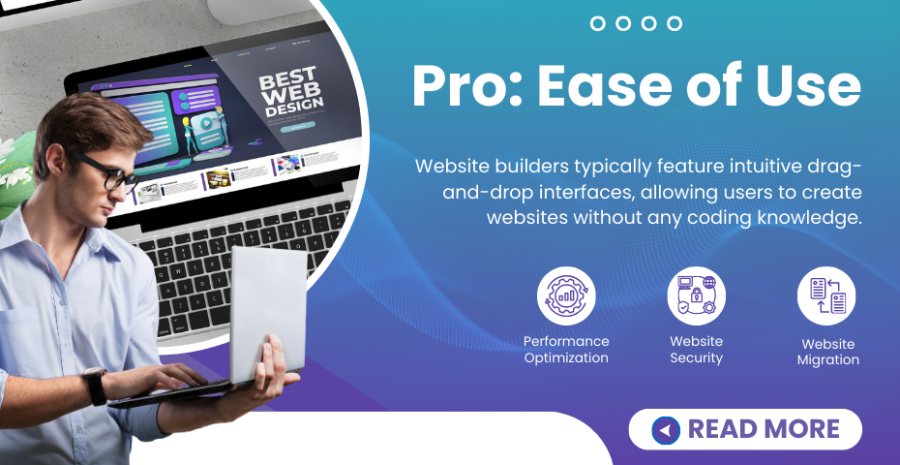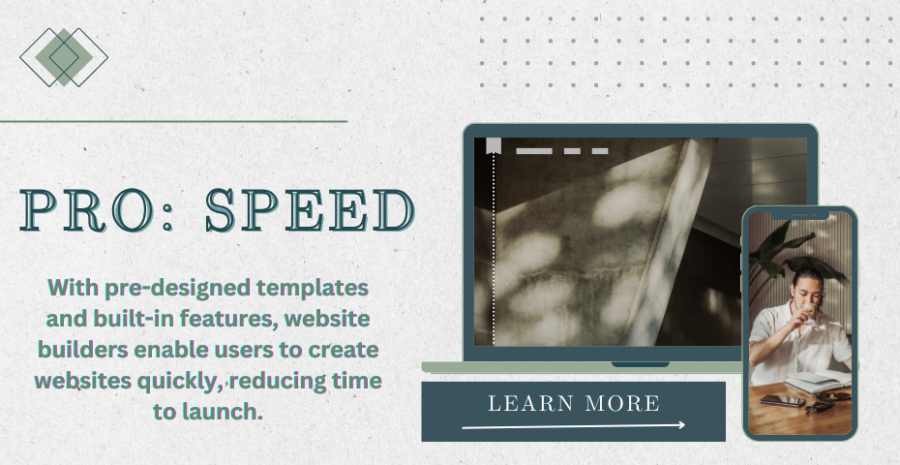
Weighing the Options: Pros and Cons of Website Builders.

Introduction:
In today's digital age, establishing an online presence is essential for businesses, organizations, and individuals alike. Website builders have emerged as a popular solution, offering a simplified and accessible way to create websites without the need for coding skills or technical expertise.
These platforms provide intuitive drag-and-drop interfaces, pre-designed templates, and a range of customizable features, making it easier than ever to build a professional-looking website quickly. However, while website builders offer numerous advantages, they also come with their own set of limitations and drawbacks.
In this comprehensive guide, we'll explore everything you need to know about the pros and cons of website builders, helping you make an informed decision when choosing the right platform for your needs. From cost considerations and customization options to SEO implications and scalability concerns, we'll delve into the various factors that can impact your decision-making process.
Whether you're a small business owner looking to establish an online presence or an aspiring blogger seeking to share your passion with the world, understanding the pros and cons of website builders is essential for creating a successful and sustainable online presence.
Website builders have revolutionized the process of creating websites, offering a convenient solution for individuals and businesses looking to establish an online presence. However, like any tool, website builders come with their own set of advantages and limitations. In this blog, we'll explore everything you need to know about the pros and cons of website builders to help you make an informed decision when building your website.
1. Pro: Ease of Use:

Website builders typically feature intuitive drag-and-drop interfaces, allowing users to create websites without any coding knowledge. One of the most significant advantages of website builders is their unparalleled ease of use, making them accessible to individuals with little to no technical expertise. These platforms typically feature intuitive drag-and-drop interfaces, allowing users to create and customize websites effortlessly.
With no coding knowledge required, users can simply select elements, such as text boxes, images, and widgets, and place them on their website with a few clicks of a mouse. This simplicity streamlines the website creation process, enabling users to design and publish professional-looking websites in a fraction of the time it would take using traditional methods.
Additionally, website builders often provide pre-designed templates that users can customize to suit their specific needs and preferences, further simplifying the design process. Overall, the ease of use offered by website builders democratizes website creation, empowering individuals and businesses to establish an online presence quickly and efficiently.
2. Pro: Cost-Effective:

Website builders often offer affordable pricing plans, making them accessible to individuals and small businesses with limited budgets. One of the notable advantages of website builders is their cost-effectiveness, making them an attractive option for individuals and small businesses with limited budgets. Unlike custom website development, which can incur significant upfront costs, website builders typically offer affordable pricing plans.
These plans often include all the necessary features for website creation, such as hosting, domain registration, and design tools, at a fraction of the cost of hiring a web developer. Additionally, website builders frequently offer free plans or trials, allowing users to explore the platform's features before committing to a paid subscription.
With transparent pricing and no hidden fees, website builders provide a predictable and manageable expense for users, enabling them to create professional-looking websites without breaking the bank. Overall, the cost-effectiveness of website builders democratizes access to website creation, empowering individuals and businesses of all sizes to establish an online presence within their budget constraints.
3. Pro: Speed:

With pre-designed templates and built-in features, website builders enable users to create websites quickly, reducing time to launch. One of the significant benefits of using website builders is their ability to expedite the website creation process.
With pre-designed templates, intuitive drag-and-drop interfaces, and built-in features, website builders enable users to design and launch websites quickly and efficiently. Users can simply select a template that aligns with their vision, customize it to their liking, and publish their website in a matter of hours or days, rather than weeks or months.
This rapid turnaround time is particularly advantageous for individuals and businesses looking to establish an online presence swiftly, such as startups, freelancers, or those promoting time-sensitive events or promotions. Moreover, website builders often include integrated features such as domain registration and hosting, eliminating the need to set up separate accounts or manage multiple services.
Overall, the speed and efficiency of website builders streamline the website creation process, enabling users to bring their online vision to life in record time.
4. Pro: Customization Options:

While templates provide a starting point, website builders offer customization features to personalize the look and feel of your website. One of the primary advantages of website builders is the extensive range of customization options they offer, allowing users to create unique and personalized websites tailored to their specific needs and preferences.
Website builders typically provide a wide selection of pre-designed templates, each with customizable layouts, colors, fonts, and images, giving users a starting point for their website design. Additionally, users can easily add or remove elements such as text boxes, images, videos, and widgets using intuitive drag-and-drop interfaces, providing full control over the website's appearance and functionality.
Advanced customization options, such as the ability to modify HTML and CSS code, may also be available for users with more technical expertise. Furthermore, website builders often integrate with third-party apps and plugins, allowing users to extend the functionality of their websites with features such as e-commerce, social media integration, and analytics.
Overall, the extensive customization options provided by website builders empower users to create visually stunning and functionally rich websites that reflect their brand identity and resonate with their target audience.
5. Pro: Support and Maintenance:

Many website builders provide customer support and handle maintenance tasks such as security updates and backups. One of the significant advantages of using website builders is the comprehensive support and maintenance services they often provide.
Many website builder platforms offer dedicated customer support channels, including live chat, email, and phone support, to assist users with any questions or technical issues they may encounter during the website creation process. Additionally, users can often access extensive knowledge bases, tutorials, and user forums, where they can find helpful resources, tips, and troubleshooting guides.
Moreover, website builder platforms typically handle routine maintenance tasks such as security updates, software upgrades, and server maintenance, relieving users of the burden of managing these tasks themselves. This ensures that users' websites remain secure, up-to-date, and functioning optimally at all times, without requiring any additional effort on their part.
Overall, the robust support and maintenance services provided by website builders contribute to a seamless and hassle-free website creation experience, allowing users to focus on growing their online presence without worrying about technical issues or maintenance tasks.
6. Pro: Scalability:

Some website builders offer scalability options, allowing users to upgrade their plans and add features as their website grows. One of the key benefits of website builders is their scalability, offering users the flexibility to grow their websites alongside their businesses or personal projects.
Website builders typically offer a range of subscription plans, allowing users to start with a basic plan and easily upgrade to higher-tier plans as their needs evolve. With scalable plans, users can access additional features, storage, bandwidth, and resources to accommodate increased website traffic, content, and functionality.
Moreover, website builders often provide built-in tools and integrations for expanding website capabilities, such as e-commerce functionality, membership portals, and blog platforms. This scalability enables users to adapt their websites to changing requirements, such as expanding product lines, launching new services, or catering to a larger audience.
Additionally, website builders handle the technical aspects of scaling, such as server management and performance optimization, ensuring that users' websites remain fast, responsive, and reliable as they grow. Overall, the scalability offered by website builders empowers users to build and expand their online presence with ease, without being limited by technical constraints or resource limitations.
6. Con: Limited Flexibility:

Despite customization options, website builders may have limitations in terms of design flexibility and functionality. While website builders offer convenience and ease of use, they often come with the drawback of limited flexibility in terms of design and functionality.
Users may find themselves constrained by the templates and design options provided by the platform, limiting their ability to create a truly unique and custom website. Additionally, website builders may lack advanced customization options, such as the ability to modify HTML and CSS code, which can hinder users with specific design requirements or preferences.
Moreover, users may encounter limitations when trying to integrate third-party tools, plugins, or custom scripts into their websites, restricting the functionality and scalability of their online presence. As a result, users who require highly customized or specialized features may find themselves frustrated by the limitations imposed by website builders, ultimately leading them to seek alternative solutions for their website needs.
Overall, the limited flexibility of website builders can be a significant drawback for users with specific design or functionality requirements, prompting them to explore other options for building their websites.
7. Con: Template Dependency:

Users may encounter limitations or difficulties if they want to deviate significantly from the provided templates. One notable drawback of website builders is the dependency on templates, which can limit creativity and originality in website design.
While templates provide a convenient starting point for users, they may also result in websites that look similar to others using the same template. Users may find it challenging to create a truly unique and distinctive website that stands out from the crowd when relying heavily on pre-designed templates.
Additionally, users may encounter limitations or difficulties if they want to deviate significantly from the provided templates, such as modifying the layout or design elements beyond the platform's capabilities. Moreover, template dependency may lead to a lack of flexibility in adapting the website to changing needs or trends, as users are confined to the features and designs offered by the platform.
As a result, users may feel constrained by template dependency, ultimately compromising their ability to create a website that accurately reflects their brand identity and meets their specific requirements. Overall, while templates can expedite the website creation process, their dependency may limit users' creativity and customization options, posing a significant drawback for some users.
8. Con: SEO Limitations:

Website builders may have limitations in optimizing websites for search engines compared to custom-built websites. A notable downside of website builders is the potential for SEO limitations, which can impact a website's visibility and ranking in search engine results.
While website builders may offer basic SEO features such as meta tags, titles, and descriptions, they often lack the advanced optimization capabilities required to compete effectively in highly competitive search environments. Users may find themselves limited in their ability to customize on-page elements, optimize for specific keywords, or implement advanced SEO strategies such as schema markup or structured data.
Additionally, website builders may generate code that is not optimized for search engines, leading to slow page load times or issues with crawling and indexing. As a result, websites built on website builders may struggle to achieve high rankings in search engine results pages (SERPs), limiting their organic traffic and visibility online. Overall, the SEO limitations of website builders can be a significant drawback for users seeking to maximize their website's search engine performance and reach.
9. Con: Branding and Ownership:

Some website builders may impose branding or ownership restrictions, limiting control over your website. One significant drawback of using website builders is the potential for branding and ownership restrictions imposed by the platform. Some website builders may require users to display the platform's branding, such as logos or advertisements, on their websites, particularly on free or lower-tier plans.
This can detract from the professionalism and credibility of the website, as visitors may perceive it as less legitimate or trustworthy. Additionally, users may find themselves limited in their ability to customize or remove branding elements, compromising their control over the website's appearance and branding. Moreover, website builders may impose ownership restrictions on user content and data, retaining certain rights to use or distribute the content created on their platforms.
This can raise concerns about privacy, intellectual property rights, and data security, as users may not have full ownership or control over their website's content and assets. Overall, the branding and ownership restrictions imposed by website builders can be a significant drawback for users seeking full autonomy and control over their online presence.
10. Con: Performance Concerns:

Websites built with website builders may experience performance issues, particularly as traffic increases. One downside of using website builders is the potential for performance concerns, which can impact the speed, reliability, and user experience of the website.
Websites built on website builders may suffer from slower page load times and decreased performance compared to custom-built websites, particularly as the website grows in size and complexity. Additionally, website builders may generate bloated or inefficient code, leading to issues with website responsiveness and optimization. Users may also encounter limitations in terms of server resources and bandwidth, which can result in downtime or slow-loading pages during periods of high traffic.
Moreover, websites built on website builders may lack advanced performance optimization features, such as caching, compression, or image optimization, further exacerbating performance issues. Overall, the performance concerns associated with website builders can negatively impact the user experience and hinder the website's ability to attract and retain visitors.
11. Con: Migration Challenges:

Switching away from a website builder to a different platform or custom solution can be complex and time-consuming. One notable challenge associated with website builders is the complexity of migrating websites to different platforms or custom solutions.
Users who outgrow their website builder or wish to switch to a more flexible platform may encounter significant hurdles when attempting to migrate their website. Website builders often use proprietary technology and file formats, making it difficult to transfer content, design elements, and functionality to other platforms seamlessly.
Additionally, users may need to manually recreate their website's layout, design, and content on the new platform, which can be time-consuming and labor-intensive. Moreover, website builders may restrict users from exporting their website's data in a format that is compatible with other platforms, further complicating the migration process.
As a result, users may find themselves locked into their website builder platform, unable to easily transition to alternative solutions without significant disruption to their online presence. Overall, the migration challenges associated with website builders can pose a significant barrier for users seeking to switch platforms or expand their website's capabilities in the future.
Conclusion:
While website builders offer convenience and affordability, they also come with limitations that users should consider carefully. By weighing the pros and cons outlined in this blog, you can make an informed decision about whether a website builder is the right choice for your online presence.
while website builders offer numerous advantages such as ease of use, cost-effectiveness, and scalability, they also come with their own set of limitations and challenges. Users must carefully weigh the pros and cons of website builders to determine whether they align with their specific needs, goals, and priorities.
Despite their convenience, website builders may not be suitable for every scenario, particularly for users with advanced customization requirements or specific design preferences. It's essential for users to consider factors such as flexibility, performance, and ownership rights when evaluating website builders as a solution for their online presence.
Moreover, users should be mindful of the potential limitations and drawbacks associated with website builders, such as template dependency, SEO limitations, and migration challenges. Ultimately, the decision to use a website builder should be informed by careful consideration of the trade-offs involved, as well as an understanding of the user's long-term goals and requirements.
By weighing the options and making an informed decision, users can leverage the benefits of website builders while mitigating the associated risks and challenges, ultimately achieving their desired online presence effectively and efficiently.
(3).jpg)
About: Andries vanTonder
45 years selfemployed
He is a Serial Entrepreneur, an Enthusiastic supporter of Blockchain Technology and a Cryptocurrency Investor
Find me: Markethive Profile Page | My Twitter Account | My Instagram Acount | and my Facebook Profile.
